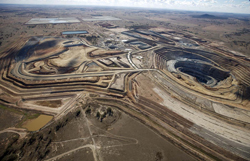Esta entrada también está disponible en: Spanish
October 27, 2011. Buenos Aires, Argentina. In the midst of accelerating capital flight, a Presidential Decree forces mining companies to bring revenue dollars back to Argentina. With a recent landslide election victory by the incumbent government guaranteeing 4 more years of policy continuity, the financial costs of doing mining-business operations may increase considerably in the years to come.
The Canadian mining company Minera Andes issued a press release early today to its shareholders indicating,
“Minera Andes has learned that the government of Argentina announced a change to a 2004 decree which had previously exempted the mining industry from a requirement to repatriate revenues from exports. As further information becomes available, we will evaluate the impact that this may have on our operating costs. “
Another company, Xstrata Copper, refused to comment to the Dow Jones journalist seeking comments to the decree. Mining companies across Argentina are contacting their accountants to get a run down on how the mechanics of the new banking regulation will work in practice, and more importantly, how much it’s going to cost.
The news is yet another blow to Argentina’s mining sector, which is slowly losing many of the benefits gained in the bliss 1990s, when under the Menem Administration, Argentina opened its doors to mining dollars, reforming its laws such as the mining code to favor high profit international investments, granting enormous tax benefits, and allowing mining companies to conduct their business transactions wherever they considered it most beneficial. Of course none of it would occur in Argentine banks, which are some of the most expensive and insecure in the world. In the words of Jorge Mayoral, Argentina’s National Mining Secretary, Argentina was slated to become the world’s number one mining country.
While Mayoral still heads the federal Mining Secretariat, financial times are changing … rising taxes (a recent upward slide of the retention fees from 3% at the mine to 15 % of revenues—in some jurisdictions), anti open pit mining legislation in provinces such as Mendoza, Córdoba, and others, new local government policy such as in Jujuy Province for lithium extraction, obliging the mining sector to process lithium in-country, and growing civil protest against mining operations across the country, including the recent cancellation by the legislative branch of Mendoza Province of the San Jorge project (Coro Mining), are but a few signals that the mining bonanza is reaching its limit.
The new presidential decree bluntly calls for:
“Reestablishment of the obligation to enter and negotiate the totality of revenues in the national exchange market, from export operations by companies producing crude oil or derivatives, natural gas, liquid gas, and companies that have as their objective, the development of mining activities”.
Simply stated, if a mining company could once sell millions of dollars worth of minerals on the international market, and have those funds deposited in an off-shore bank of its choice, avoiding all pertinent (and expensive) financial transaction costs that would normally apply in a commercial trade transactions in Argentina (bank fees, exchange fees, etc.), now, those millions of dollars will have to be wired by the buyer to the company’s account in an Argentine bank, the purchase funds are exchanged into local currency (loosing once with the exchange rate), and then if the mining company wants to secure those funds in dollar or other currency denominations abroad, the company will have to transfer the funds back into a foreign currency (loosing again), and wire the funds to its offshore account, paying of course, all corresponding fees. It’s more expensive for the buyer, and cuts into the profits of the mining company, hence Minera Andes’ communication to its shareholders. The message is short and very clear, “expect profits to fall”.
For more information:
tel: +54 9 351 507 8376

